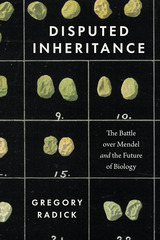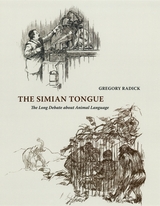2 books by Radick, Gregory

Disputed Inheritance
The Battle over Mendel and the Future of Biology
Gregory Radick
University of Chicago Press, 2023
A root-and-branch rethinking of how history has shaped the science of genetics.
In 1900, almost no one had heard of Gregor Mendel. Ten years later, he was famous as the father of a new science of heredity—genetics. Even today, Mendelian ideas serve as a standard point of entry for learning about genes. The message students receive is plain: the twenty-first century owes an enlightened understanding of how biological inheritance really works to the persistence of an intellectual inheritance that traces back to Mendel’s garden.
Disputed Inheritance turns that message on its head. As Gregory Radick shows, Mendelian ideas became foundational not because they match reality—little in nature behaves like Mendel’s peas—but because, in England in the early years of the twentieth century, a ferocious debate ended as it did. On one side was the Cambridge biologist William Bateson, who, in Mendel’s name, wanted biology and society reorganized around the recognition that heredity is destiny. On the other side was the Oxford biologist W. F. R. Weldon, who, admiring Mendel's discoveries in a limited way, thought Bateson's "Mendelism" represented a backward step, since it pushed growing knowledge of the modifying role of environments, internal and external, to the margins. Weldon's untimely death in 1906, before he could finish a book setting out his alternative vision, is, Radick suggests, what sealed the Mendelian victory.
Bringing together extensive archival research with searching analyses of the nature of science and history, Disputed Inheritance challenges the way we think about genetics and its possibilities, past, present, and future.
In 1900, almost no one had heard of Gregor Mendel. Ten years later, he was famous as the father of a new science of heredity—genetics. Even today, Mendelian ideas serve as a standard point of entry for learning about genes. The message students receive is plain: the twenty-first century owes an enlightened understanding of how biological inheritance really works to the persistence of an intellectual inheritance that traces back to Mendel’s garden.
Disputed Inheritance turns that message on its head. As Gregory Radick shows, Mendelian ideas became foundational not because they match reality—little in nature behaves like Mendel’s peas—but because, in England in the early years of the twentieth century, a ferocious debate ended as it did. On one side was the Cambridge biologist William Bateson, who, in Mendel’s name, wanted biology and society reorganized around the recognition that heredity is destiny. On the other side was the Oxford biologist W. F. R. Weldon, who, admiring Mendel's discoveries in a limited way, thought Bateson's "Mendelism" represented a backward step, since it pushed growing knowledge of the modifying role of environments, internal and external, to the margins. Weldon's untimely death in 1906, before he could finish a book setting out his alternative vision, is, Radick suggests, what sealed the Mendelian victory.
Bringing together extensive archival research with searching analyses of the nature of science and history, Disputed Inheritance challenges the way we think about genetics and its possibilities, past, present, and future.
[more]

The Simian Tongue
The Long Debate about Animal Language
Gregory Radick
University of Chicago Press, 2007
In the early 1890s the theory of evolution gained an unexpected ally: the Edison phonograph. An amateur scientist used the new machine—one of the technological wonders of the age—to record monkey calls, play them back to the monkeys, and watch their reactions. From these soon-famous experiments he judged that he had discovered “the simian tongue,” made up of words he was beginning to translate, and containing the rudiments from which human language evolved. Yet for most of the next century, the simian tongue and the means for its study existed at the scientific periphery. Both returned to great acclaim only in the early 1980s, after a team of ethologists announced that experimental playback showed certain African monkeys to have rudimentarily meaningful calls.
Drawing on newly discovered archival sources and interviews with key scientists, Gregory Radick here reconstructs the remarkable trajectory of a technique invented and reinvented to listen in on primate communication. Richly documented and powerfully argued, The Simian Tongue charts the scientific controversies over the evolution of language from Darwin’s day to our own, resurrecting the forgotten debts of psychology, anthropology, and other behavioral sciences to the Victorian debate about the animal roots of human language.
[more]
READERS
Browse our collection.
PUBLISHERS
See BiblioVault's publisher services.
STUDENT SERVICES
Files for college accessibility offices.
UChicago Accessibility Resources
home | accessibility | search | about | contact us
BiblioVault ® 2001 - 2024
The University of Chicago Press









